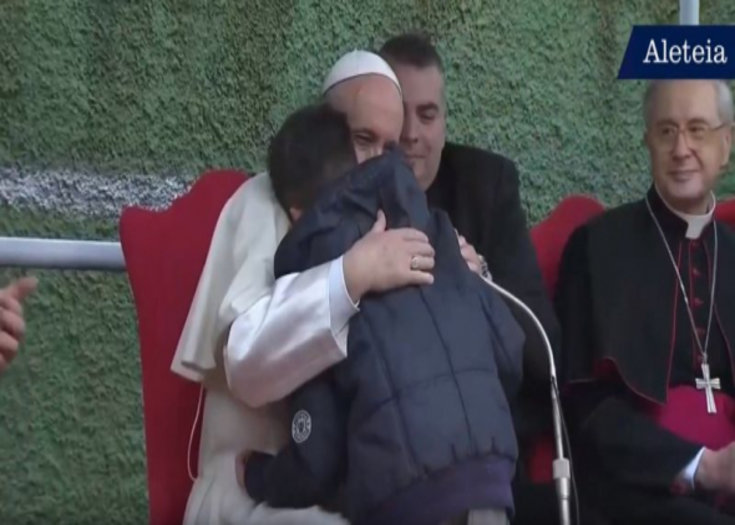Recently Pope Francis was approached by a crying boy who had just lost his atheist father, who asked the Pope whether or not his dad was in heaven.
A pastor from a megachurch in Virginia was vocal about his disagreement with Pope Francis’ answer and how he handled the question in general.
In April, Emanuele, the young boy, approached Pope Francis while he was meeting with parishioners at St. Paul of the Cross at the Vatican.
Emanuele asked the Pope his question by whispering to the Catholic leader, and then the Pope repeated it so everyone in attendance could hear.
“A short time ago, my dad died. He was an atheist, but he had all four of his children baptized. He was a good man. Is Dad in heaven?” He asked.
The Roman Catholic Church leader partially avoided the question at first, stating that it was “beautiful” that Emanuele called his father “good.” He then commended the father for baptizing his children, even though he himself was an atheist.
“God is the one who decides who goes to Heaven. But how does God’s heart react to a Dad like that? How? What do you think? … A dad’s heart! God has the heart of a father,” he stated.
“And faced with a dad, a nonbeliever, who was able to have his children baptized and to give them that courage, do you think that God would be capable of leaving him far from Him?” Pope Francis concluded.
Pope Francis Takes on ‘Fake News’ With a Surprising Warning to Journalists
But that answer did not sit well with everyone, including a pastor from Immanuel Bible Church, a megachurch in Northern Virginia. Pastor Jordan Standridge, the pastor of evangelism at Immanuel, penned a blog post, arguing that the Pope should have answered in a different way.
The pastor of evangelism grew up in Rome as the son of missionary parents and has experience with the Roman Catholic church.
Standridge commented that he would have handled the entire situation differently. He said he would first comfort the young boy about the passing of his father: comfort the boy by saying:
“I am so sorry this has happened. Anytime a loved one dies it is a tragedy that we don’t know how to deal with, since the one we love has been taken from us. My heart is breaking with you over the loss of your father. I wish I could take the pain away but I cannot. All I can do is tell you about the One who can.”
He also differed from the Pope on what he would tell the boy about his father’s place in an afterlife. He would explain the reality of Heaven and Hell and the honest and hard truth of salvation.
He wrote: “I wish I could tell you that your dad is in Heaven. I can’t. I can tell you that if he repented of his sin, and placed his total faith and trust in Jesus even in his last days on earth, that he is. But I’ll tell you something, wherever he is, he knows two things–that God is Holy, and that he wasn’t.”
Towards the end of his post, Standridge argued that he understands that Pope Francis “doesn’t believe what I’ve written here, so we shouldn’t expect him to be able to answer this way.”
Pope Francis Proposes Major Change to Translation of the Lord’s Prayer
Immanuel describes itself as a “non-denominational Bible Church with a strong tradition of exegetical preaching,” which aligns with the beliefs on heaven and hell that Standridge explained.
This is not the first time that Pope Francis has been criticized for his thoughts on the afterlife. Recently, he was also criticized by an atheist philosopher who stated that Francis told him, “Hell does not exist” and that “those who do not repent and cannot therefore be forgiven disappear.”
The Vatican refuted the claims of Eugenio Scalfari, stating that what Scalfari said “is the result of his reconstruction, in which the literal words pronounced by the Pope are not quoted.”
Some also pointed out that Pope Francis never actually answered Emanuele’s question, as he didn’t give him a firm answer on whether or not his dad is in Heaven.
“When Pope Francis says that ‘God is the one who says who goes to Heaven,’ he resists placing himself above God or making an idol of our human rules and limited understanding of God. He chooses to act on what he knows of God rather than to limit God by conjecture about the afterlife,” Bentz wrote in America Magazine.
“Sometimes we contrast the technical truth of church teaching with its pastoral application. As though the people of God cannot handle the truth but are best fed with weak platitudes of God’s love. I do not think this is what Pope Francis was doing with young Emanuele. He was not just being nice, that way avoiding telling a little boy the hard truth that his father was not in Heaven. It doesn’t work that way,” Bentz added.
“A pastoral response is church teaching articulated in the face of vulnerable humanity. It is teaching distilled to its basic ingredients of love and invitation — the permanent invitation to follow Christ into a radical relationship with the world,” he concluded.



